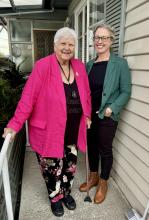This month is “April No Falls”, which is an international campaign that aims to encourage us to recognise the risks that falls pose and to highlight the importance of prevention, particularly for older people.
For ‘April No Falls Month’, the Department of Health is focusing on awareness of risks within the home by encouraging Tasmanians to learn more about how to take simple actions to help stay safe and preventing falls from occurring.
Trips and falls are one of the most commonly occurring incidents affecting older people as each year 30% of Australians over the age of 65 have some kind of fall. It is also one of the most serious types of incidents as 37% of injury related deaths are caused by falls, according to New South Wales Fall Prevention and Health Ageing Network.
Department of Health Associate Secretary, Shane Gregory, has welcomed the campaign that raises awareness about the impact of falls and the best practices to prevent serious or fatal injury.
“Falls can restrict activity, and significantly reduce quality of life and independence, especially among older Tasmanians,” Mr Gregory said.
“People with increased risk of falls include those with visual impairment, cognitive impairment, multiple sclerosis, Parkinson’s disease and intellectual disability, as well as people who have recently been hospitalised due to a fall.”
“Prevention is key so it’s crucial people to talk with their GP about their concerns, manage existing health issues, get vision and hearing checked review home for hazards, and prioritise regular exercise which can reduce the chance of falls by 23%.”
As part of the push for prevention, the No Falls Month campaign encourages the community to plan for a future fall: How will you call for help? Who would you call? How could they get in your house to help? How could you get yourself up if you are not too hurt?

Mr Gregory said health professionals, such as nurse practitioners and Occupational Therapists (OTs), can help people at risk of falls, and those who have had a fall to avoid a future incident by providing information, appropriate healthcare and preventative measures.
“The THS South Community OT team visit people in their homes and do assessments which could lead to suggestions to change movement, add hand rails around the home or refer them to a physiotherapist to review someone’s balance.
“OTs can be accessed through referrals from your GP or other health professional, through the hospital, through My Aged Care, through a home care package or other funded program, or privately.”
Information about preventing falls, what to do if you fall, and more community resources can be found here: Preventing falls | Tasmanian Department of Health
